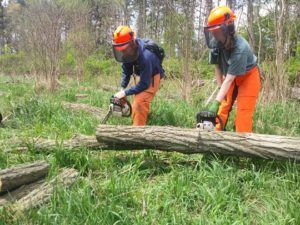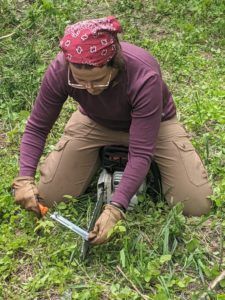Huron Pines AmeriCorps Members Learn Basics of Chainsaw Safety at MUCC Training
On Saturday, May 15, seven Huron Pines AmeriCorps members serving with various conservation organizations and agencies across Michigan joined Michigan United Conservation Clubs (MUCC) at their annual chainsaw safety training at Rose Lake State Game Area. Due to continued COVID-19 precautions, the course was not open to the public this year. Instead of our usual two-day course, we designed a one-day course to provide the AmeriCorps members with a strong foundation of basic chainsaw safety skills. The trees felled and used for training were invasive black locust trees, which are known to outcompete native flora and displace wildlife that relies on them.

Two Huron Pines AmeriCorps members work together to learn what to do when a saw becomes stuck while trying to buck a black locust tree.
The first half of the training day was spent going over the educational components of being a safe sawyer and understanding how chainsaws operate. Instructors discussed the importance of having all the appropriate personal protective equipment (PPE), how to check your saw before use to ensure safe and effective operation and how to analyze the chainsaw site and identify hazards. Also discussed were the different types of chainsaws, their components, and their uses. Many other topics were covered as well, and students took turns practicing starting their chainsaws and getting familiar with the machines before lunch.
Following a Subway lunch provided by MUCC, students then went out into the field to learn how to limb and buck downed trees. The instructors showed them multiple methods and had the AmeriCorps members think through different scenarios and analyze each situation before cutting. For example, students were taught to look to see how their cut would impact the downed tree. Should they cut from below to prevent the tree from getting their saw stuck? If they couldn’t cut from below due to limited room or other obstacles, what was the best option to safely buck or limb the tree?

A Huron Pines AmeriCorps member sharpens her chainsaw after using it to buck and limb trees.
Trainees spent a majority of the field time practicing these skills, and instructors were able to provide an abundance of one-on-one guidance to the AmeriCorps members as questions arose in the field. A tree felling demonstration was also provided to students. They were taught how to analyze the site prior to cutting and design an escape route, how to properly do a face-cut in the tree and many other aspects of felling a tree safely. Some students went on to continue practicing different felling techniques and gain familiarity with the process.
To wrap up the course, the AmeriCorps learned how to properly sharpen and disassemble the chainsaws for cleaning and other maintenance.
We would like to extend a large thank you to the volunteer instructors who helped design this course for the AmeriCorps attendees. Bill Dawson and Bill Rushford of the former Heavy Equipment Response Coalition (HERC) and sawyer Dale Franks all contributed to the success of the course, and we appreciate the time they took out of their busy schedules to help teach the training attendees how to be safe sawyers.
The post Huron Pines AmeriCorps Members Learn Basics of Chainsaw Safety at MUCC Training appeared first on Michigan United Conservation Clubs.
Recent Posts



